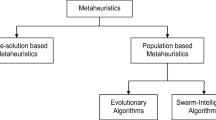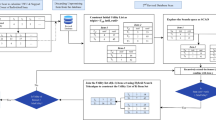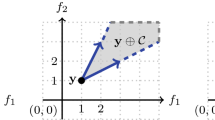Abstract
Rank Aggregation techniques have found wide applications for metasearch along with other streams such as Sports, Voting System, Stock Markets, and Reduction in Spam. This paper presents the optimization of rank lists for web queries put by the user on different MetaSearch engines. A metaheuristic approach such as Genetic algorithm based rank aggregation technique has been proposed and implemented in MATLAB for Kendall-tau as (GKTu) and Spearman’s foot rule as (GSFD) distance measures. A comparative analysis has been carried out between ranked lists for with and without GA on the basis of simulated results. From the results it has been found that proposed GA optimized rank list (for a particular query on the basis of minimum distance) is better than the conventional methods. In addition, a word association technique i.e., AND-OR operator has been applied on each query. The results are investigated in comparison to non- logic operators for the same query.




Similar content being viewed by others
References
Akritidis, L., Katsaros, D., & Bozanis, P. (2011). Effective rank aggregation for metasearching. The Journal of Systems and Software, 84, 130–143.
Aledo, J. A., Gamez, J. A., & Molina, M. (2013). Tackling the rank aggregation problem with evolutionary algorithms. The Journal of Applied Mathematics and Computation, 222, 632–644.
Arrow, K. (1951). Social choice and individual values. New York: Wiley.
Bartholdi, J. J., Tovey, C. A., & Trick, M. A. (1989). Voting schemes for which it can be difficult to tell who won the election. Social Choice and Welfare, 6(2), 157–165.
Beg, M. M. S., & Ahmad, N. (2002). Fuzzy Logic Based Rank Aggregation Methods for the World Wide Web. In Proceedings of the International Conference on Artificial Intelligence in Engineering and Technology, Malaysia (pp. 363–368).
Beg, M. M. S., & Ahmad, N. (2003). Soft computing techniques for rank aggregation on the World Wide Web. Journal of World Wide Web, 6(1), 5–22.
Borda, J. C. (1781). Mémoire sur les élections au scrutin. Histoire de l’Académie Royale des Sciences.
Condorcet, M. J. (1785). Essai sur l’application de l’analyse a la probabilite des decisions rendues a la pluralite des voix.
Diaconis, P. (1988). Group representation in probability and statistics (IMS Lecture Series 11). Hayward: Institute of Mathematical Statistics.
Diaconis, P., & Graham, R. (1977). Spearman’s footrule as a measure of disarray. Journal of the Royal Statistical Society, Series B, 39(2), 262–268.
Dwork, C., Kumar, R., Noar, M., & Sivakumar, D. (2001). Rank aggregation methods for the Web. In Proceedings of ACM Conference on World Wide Web (pp. 613–622).
Fox, Lee, K., Frieder, O., Knepper, M., & Snowberg, E. (1999). SENTINEL: A multiple engine information retrieval and visualization system. Journal of the ASIS, 50(7).
Goldberg, D. E. (1989). Book on Genetic Algorithms in Search, Optimization and Machine Learning, Addison Wesley.
Kaur, M., Kaur, P., & Singh, M. (2015). Rank Aggregation Using Mutiple Objective Genetic Algorithm. In the Proceedings of IEEE International Conference on Next Generation Technologies, Dehradun, India, (pp. 836–840).
Kemeny, K. (1959). Mathematics without numbers. Daedalus, 88, 571–591.
Kendall, M. G. (1938). A new measure of rank correlation. Biometrika, 30(1/2), 81–93.
Kleinberg, J. (1999). Authoritative sources in a hyperlinked environment. Journal of the ACM 46.
Lee, J. H. (1997). Analyses of multiple evidence combination. In Proceedings of ACM SIGIR (pp. 267–276).
Montague, M. H., & Aslam, J. A. (2001). Relevance score normalization for Metasearch (In Proceeding of Conference on Information and Knowledge Management, (pp. 427–433)). GA: Atlanta.
Montague, M. H., & Aslam, J. A. (2001b). Models of metasearch. In Proceedings of the ACM International Conference on Research and Development in Information Retrieval (SIGIR) (pp. 276–284).
Page, L., & Brin, S. (1998). The anatomy of a large-scale hypertextual Web search engine. In Proceedings of Seventh International World Wide Web Conference.
Renda, M. E., & Straccia, U. (2003). Web metasearch: Rank vs. score based rank aggregation methods. In Proceedings of ACM SAC (pp. 841–846).
Saari, D. J. (2000).The mathematics of voting: democratic symmetry, Economist. 83. Available at http://vidal.ece.sc.edu/822/papers/econ-voting.html.
Young, H. P. (1974). An axiomatization of Borda’s rule. Journal of Economic Theory 9, (pp.43-52).
Young, H. P. (1988). Condorcet’s theory of voting. American Political Science Review, 82, 1231–1244.
Young, H. P., & Levenglick, A. (1978). A consistent extension of Condorcet’s election principle. SIAM Journal on Applied Mathematics, 35(2), 285–300.
Acknowledgments
The contributions of all the authors are highly obliged for their continuous work and efforts. Also, the contributions of cited authors are highly appreciated for their research findings and quality of work. The work has been conducted at I.K Gujral Punjab Technical University, Jalandhar.
Author information
Authors and Affiliations
Corresponding author
Rights and permissions
About this article
Cite this article
Kaur, P., Singh, M. & Singh Josan, G. Comparative analysis of Rank Aggregation techniques for metasearch using genetic algorithm. Educ Inf Technol 22, 965–983 (2017). https://doi.org/10.1007/s10639-016-9467-z
Published:
Issue Date:
DOI: https://doi.org/10.1007/s10639-016-9467-z




